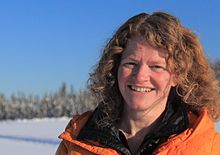Erin Pettit
Erin Pettit | |
|---|---|
 | |
| Born | 1971 |
| Nationality | American |
| Alma mater | Brown University University of Washington |
| Scientific career | |
| Fields | Glaciology Geophysics |
| Institutions | University of Alaska Oregon State University |
| Website | www |
Erin Christine Pettit (born 1971) is an American glaciologist focusing on climate change.[1] She is an associate professor of geophysics and glaciology at Oregon State University.[2] Her work focuses on ice-ocean interactions, ice-shelf disintegration, sea-level rise and ocean circulation changes.[3]
Early life and education
[edit]Pettit, born in 1971, is originally from Seattle, Washington. She started her academic career pursuing an Sc.B. in mechanical engineering at Brown University, which she received in 1994.[4] Before she attended graduate school, she lived in Los Angeles where she worked at AeroVironment and volunteered for the Sierra Club.[5] She then went on to earn her Ph.D. in Geophysics from the University of Washington in 2003,[4] where her dissertation focused on the dynamic behavior of ice divides. Pettit also worked as a postdoctoral research fellow at UW until 2006 and then became a research physical scientist at the Cold Regions Research and Engineering Lab in New Hampshire. Pettit was faculty at the University of Alaska, Fairbanks (UAF) from 2008 through 2018. She is currently an associate professor in the College of Earth, Ocean and Atmospheric Sciences at Oregon State University.
Career and impact
[edit]
Pettit's research is primarily focused on glacial dynamics and exploring the interactions within the ice-ocean-earth system. Pettit is a National Geographic Emerging Explorer who innovated applying acoustic research with hydrophones to calving and melting glaciers reaching the ocean, to examine ice shelf disintegration and the ice-ocean boundary.[6] Her work has been recognized by numerous high-profile sources, including EARTH magazine,[7] and National Geographic,[8] and she was invited to present a TEDWomen talk,[9] on her investigations focused on "listening" to glaciers.[10] Her research on glacier sounds extends to how the underwater noise affects marine animals.[3] She also founded Inspiring Girls Expeditions, a series of interdisciplinary wilderness science programs that teach high school girls about glaciology, oceanography, ecology, and mountaineering.[11] The first program, Girls on Ice, started in Washington in 1999, with Pettit taking five girls to the South Cascade Glacier.[12] During the program, adolescent girls learn mountaineering skills, how to use GPS for glacier measurement and how to calculate the velocity of streams.[13]
Awards and honors
[edit]Pettit has received numerous awards including the National Science Foundation (NSF) Geoscience El Niño RAPID Award (2016),[14] the Inspiring Women in STEM award, Insight into Diversity (2015),[15] the WINGS WorldQuest Earth Award (2007),[16] the David A. Johnston Memorial Scholarship Award (2000) as well as the UW Graduate School Merit Award (1997–1998). Pettit received the UAF Teaching Award (2012) from the UAF College of Natural Sciences and Mathematics as well as a Merit Award for Research Excellence and Coordination for the Girls on Ice Program she initiated (2011). The Girls on Ice program takes American teenage girls to Alaska and Washington State where they appreciate the climate and the experts who study it.[17]
She became a National Geographic Emerging Explorer in 2013.[8] She was appointed as a U.S. representative to the international Scientific Committee on Antarctic Research in 2016 and as a representative for the U.S. Department of State Brazil-U.S. Women in Science Program (2011). Pettit received the National Science Foundation Graduate Research Fellowship (1998–2003) and the Fannie and John Hertz Foundation Research Fellowship Grant (1997).
References
[edit]- ^ "About". ice. Retrieved 2016-05-17.
- ^ "Erin Pettit: Tracking glaciers on the move". College of Earth, Ocean, and Atmospheric Sciences. 2019-03-18. Retrieved 2021-08-24.
- ^ a b Clark, Laura (9 March 2015). "The Loud Noise of Melting Glaciers May Actually Be Good for Animals". Smithsonian. Retrieved 19 May 2016.
- ^ a b "Erin Pettit". Glaciers Group. University of Alaska Fairbanks. Retrieved 19 May 2016.
- ^ "Girls on Ice: A Mountaineering Adventure and Learning Experience for Young Women". Polar Field. 24 January 2013. Archived from the original on 28 July 2013. Retrieved 19 May 2016.
- ^ Society, National Geographic. "Erin Pettit, Geophysicist and Glaciologist Information, Facts, News, Photos -- National Geographic". Archived from the original on June 9, 2013. Retrieved 2016-06-28.
- ^ "Down to Earth With: Glaciologist Erin Pettit | EARTH Magazine". www.earthmagazine.org. Retrieved 2016-05-17.
- ^ a b "Erin Pettit, Geophysicist and Glaciologist". NationalGeographic.com. Archived from the original on June 9, 2013. Retrieved 2016-08-21.
- ^ "Toward new, more nuanced conversations: The talks in Session 5 of TEDWomen 2015". TED Blog. 2015-05-29. Retrieved 2016-05-17.
- ^ "Melting Glaciers Create Noisiest Places in Ocean, Study Says". Science Daily. 6 March 2015. Retrieved 19 May 2016.
- ^ "Instructors". Girls on Ice. Retrieved 2016-05-22.
- ^ Rozell, Ned (11 February 2012). "'Girls on Ice' Program in Alaska, Washington Triggers Interest in Science". Alaska Dispatch News. Retrieved 19 May 2016.
- ^ Bolen, Anne (October 2006). "Glaciologist Puts Her Girls on Ice". Smithsonian. Retrieved 19 May 2016.
- ^ "NSF Awards Rapid Response Grants to Study Current El Niño, One of the Strongest on Record". National Science Foundation. 2 February 2016. Retrieved 19 May 2016.
- ^ "100 Inspiring Women in STEM Awards". INSIGHT Into Diversity. 2015-08-18. Retrieved 2016-05-17.
- ^ "Erin Pettit". WINGS WorldQuest. Retrieved 2016-05-17.
- ^ About, Girls On Ice, Retrieved 21 August 2016
External links
[edit]- Erin Pettit publications indexed by Google Scholar


 French
French Deutsch
Deutsch